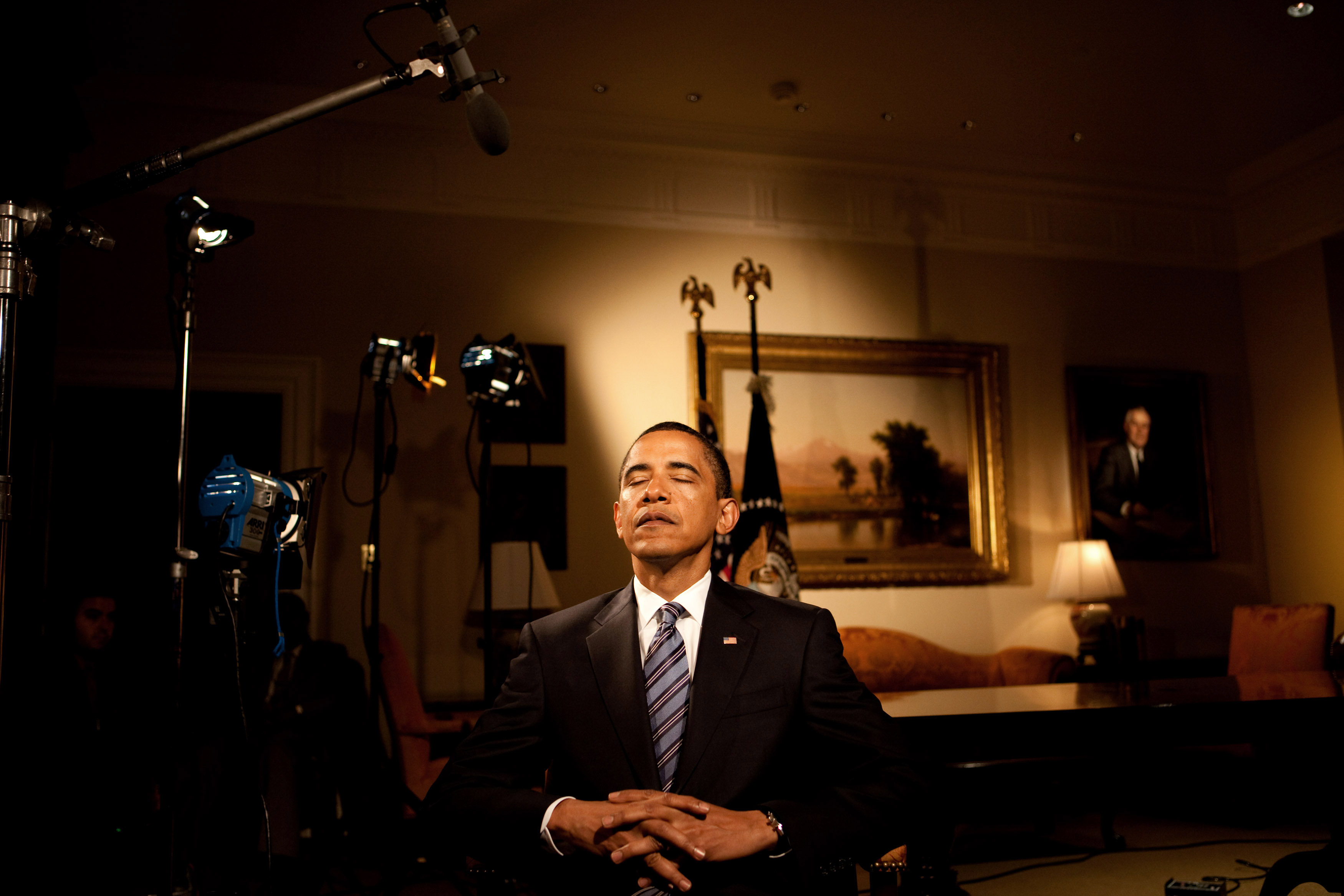The strange serenity of Barack Obama
He accepts the things he cannot change, and tries to change the things he believes he can


A free daily email with the biggest news stories of the day – and the best features from TheWeek.com
You are now subscribed
Your newsletter sign-up was successful
President Obama disappointed liberal detractors and admirers alike last week when, in his last press conference of the year, he did not go ballistic about Russian efforts to tip the presidential election to an unqualified and bigoted clown, but instead spoke about Russia's electoral meddling in the slightly-bored tone of a medical examiner.
What exactly did liberals expect? The declaration of a national emergency? Some kind of ex officio delegitimizing of the president-elect? A Rudy Giuliani-style gambit to hang onto the presidency?
None of that is Barack Obama's style. Indeed, for better and worse, Obama has been the Serenity Prayer president.
The Week
Escape your echo chamber. Get the facts behind the news, plus analysis from multiple perspectives.

Sign up for The Week's Free Newsletters
From our morning news briefing to a weekly Good News Newsletter, get the best of The Week delivered directly to your inbox.
From our morning news briefing to a weekly Good News Newsletter, get the best of The Week delivered directly to your inbox.
God, grant me the serenity to accept the things I cannot changeCourage to change the things I canAnd wisdom to know the difference. [Serenity Prayer]
This is our president. He accepts the things he cannot change, and tries to change the things he believes he can. In political rather than spiritual terms, Obama's presidency has seemingly toggled between resignation and targeted, bold strikes.
Rewind to January 2010, when Scott Brown, a little-known Massachusetts Republican, won a special election to replace the late Sen. Ted Kennedy — robbing Obama of his 60-seat supermajority in the Senate. Though counseled to moderate his healthcare reform proposal, Obama famously told aides "I feel lucky" and committed to an aggressive plan to push through a portion of the bill under Senate budget-reconciliation rules, thereby avoiding a Republican filibuster. Senior strategist David Axelrod recalled Obama's thinking thusly: "I get the politics of this, but if we don't do this now, it probably wouldn't happen … Are we going to put our approval rating on the shelf and admire it for eight years, or are we here to spend our political capital and try and do things of lasting importance for the country?"
The Serenity Prayer famously asks for wisdom to know the difference between changeable and unchangeable situations. On healthcare, wisely or not, Obama boldly chose to push for change. He succeeded. And he paid the price.
After the disastrous 2010 congressional midterm elections, Obama, reflecting on his party's "shellacking," predicted his relationship with the public would "have some more ups and downs." Obama then, quietly and improbably, reached one of the few compromises he would ever reach with congressional Republicans: a deal to extend Bush-era tax rates for two years paired with a package of unemployment benefits and tax incentives for businesses. Conservative columnist Charles Krauthammer decried the compromise bill as "Stimulus II," a deficit-financed "free lunch": "[T]he package will add as much as 1 percent to GDP and lower the unemployment rate by about 1.5 percentage points. That could easily be the difference between victory and defeat in 2012," Krauthammer noted, presciently.
A free daily email with the biggest news stories of the day – and the best features from TheWeek.com
Victory in 2012 came and went, followed by yet another midterm shellacking in 2014. Again, Obama emerged unruffled. "There are times when you're a politician and you're disappointed with election results," he said. "But maybe I'm just getting older. I don't know. It doesn't make me mopey."
Obama then declared that he would use his "pen and phone" to essentially make an end-run around a recalcitrant Congress. The Obama pen gave us far-reaching executive orders on immigration, gun control, a raise in pay for federal contractors, and an increase of the overtime salary threshold for millions of workers (not technically an executive order, but rather a "rule change" to the Fair Labor Standards Act).
To apply the Serenity Prayer principle, Obama came to believe that a cooperative relationship with Republicans was beyond his control. And so he looked for levers of power more firmly in his grasp.
There is, of course, plenty of room to criticize Obama's Serenity-ism. During the "fiscal cliff" negotiations of late 2012, for instance, liberals argued that Obama had more control over the situation than he realized and failed to extract maximal concessions from Republicans. Similarly, in the foreign policy arena, conservatives have argued that Obama far too passively watched Vladimir Putin move to reconsolidate the periphery of the old Soviet Union and the Middle East as it deteriorated into chaos.
And — to return to the angst-making present — why didn't he do more to deter or punish Russian hacking?
The clue to Obama's thinking can be found in the Serenity Prayer principle. In his press conference last Friday, Obama seemed angrier at the national news media than he was at Putin. "I am finding [it] a little curious that everyone is acting surprised that this looked like it was disadvantaging Hillary Clinton," he said, "because you guys wrote about it every day. Every single leak about every little juicy tidbit of political gossip, including John Podesta's risotto recipe. This was an obsession that dominated the news coverage."
Translation: We cannot control, we can only respond to, the behavior of a foreign adversary. But the amplification of Putin's obvious hackery by the media was entirely in our control.
The qualities of impulse control, strategic restraint, steadiness of temperament: These are manifestly not shared by Obama's successor. And as confounding as we may have found them at times, I believe all of us, liberal or conservative, will come to miss them very soon.
Scott Galupo is a freelance writer living in Virginia. In addition to The Week, he blogs for U.S. News and reviews live music for The Washington Post. He was formerly a senior contributor to the American Conservative and staff writer for The Washington Times. He was also an aide to Rep. John Boehner. He lives with his wife and two children and writes about politics to support his guitar habit.
-
 ‘The West needs people’
‘The West needs people’Instant Opinion Opinion, comment and editorials of the day
-
 Filing statuses: What they are and how to choose one for your taxes
Filing statuses: What they are and how to choose one for your taxesThe Explainer Your status will determine how much you pay, plus the tax credits and deductions you can claim
-
 Nan Goldin: The Ballad of Sexual Dependency – an ‘engrossing’ exhibition
Nan Goldin: The Ballad of Sexual Dependency – an ‘engrossing’ exhibitionThe Week Recommends All 126 images from the American photographer’s ‘influential’ photobook have come to the UK for the first time
-
 The billionaires’ wealth tax: a catastrophe for California?
The billionaires’ wealth tax: a catastrophe for California?Talking Point Peter Thiel and Larry Page preparing to change state residency
-
 Bari Weiss’ ‘60 Minutes’ scandal is about more than one report
Bari Weiss’ ‘60 Minutes’ scandal is about more than one reportIN THE SPOTLIGHT By blocking an approved segment on a controversial prison holding US deportees in El Salvador, the editor-in-chief of CBS News has become the main story
-
 Has Zohran Mamdani shown the Democrats how to win again?
Has Zohran Mamdani shown the Democrats how to win again?Today’s Big Question New York City mayoral election touted as victory for left-wing populists but moderate centrist wins elsewhere present more complex path for Democratic Party
-
 Millions turn out for anti-Trump ‘No Kings’ rallies
Millions turn out for anti-Trump ‘No Kings’ ralliesSpeed Read An estimated 7 million people participated, 2 million more than at the first ‘No Kings’ protest in June
-
 Ghislaine Maxwell: angling for a Trump pardon
Ghislaine Maxwell: angling for a Trump pardonTalking Point Convicted sex trafficker's testimony could shed new light on president's links to Jeffrey Epstein
-
 The last words and final moments of 40 presidents
The last words and final moments of 40 presidentsThe Explainer Some are eloquent quotes worthy of the holders of the highest office in the nation, and others... aren't
-
 The JFK files: the truth at last?
The JFK files: the truth at last?In The Spotlight More than 64,000 previously classified documents relating the 1963 assassination of John F. Kennedy have been released by the Trump administration
-
 'Seriously, not literally': how should the world take Donald Trump?
'Seriously, not literally': how should the world take Donald Trump?Today's big question White House rhetoric and reality look likely to become increasingly blurred
